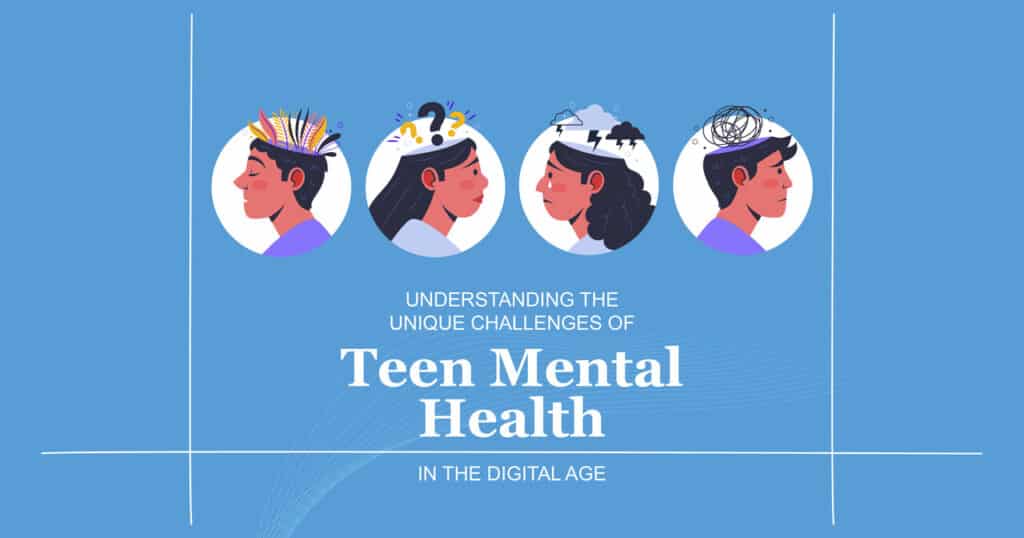The digital age has brought about incredible changes in how we live, work, and interact with the world. For teenagers, who are in a critical stage of development, the impact of digital technologies is particularly profound. Social Media usage, driven by constant connectivity and mobile technologies, shapes not only their social lives but also their mental health, often contributing to both positive and negative outcomes.
Essential Takeaways:
- Balance is Essential: Help teens find a healthy balance between online and offline activities.
- Communication Matters: Keep communication open to build trust and provide support.
- Build Resilience: Encourage resilience and digital literacy to help teens navigate the digital world confidently.
From social media platforms to online gaming, the internet has become an integral part of their daily lives. However, while these advancements offer many benefits, they also present unique challenges that can affect teen mental health in significant ways. Adolescents’ digital technology usage has skyrocketed, and understanding how it influences their mental well-being is crucial. In this blog post, we’ll explore the complex relationship between teens and digital technologies, delving into how the digital world can influence their psychological well-being.
The Digital World: A Double-Edged Sword
The Benefits of Digital Technology for Teens
Let’s start by acknowledging that digital technology isn’t all bad. It offers numerous benefits that can positively impact a teenager’s life. For instance, social networking sites provide teens with access to a vast amount of information, whether researching for a school project or learning a new hobby. Social networks also allow them to maintain relationships with friends and family, even when they’re far apart, fostering essential social interactions and emotional support crucial for their mental well-being.
Moreover, digital communication can foster creativity and self-expression. Platforms like YouTube, TikTok, and Instagram allow teens to share their talents, whether through art, music, or storytelling. For some, this can be an outlet for expressing emotions and building psychological well-being. Mobile technologies and online interactions also create avenues for teens to explore new hobbies and learn skills, contributing positively to their mental health.
The Dark Side: How Digital Technology Can Affect Mental Health
However, the digital world isn’t without its downsides. Social media platforms can lead to psychological distress and trigger depressive symptoms in adolescents. One of the most significant issues is the pressure to maintain a perfect online persona. Social comparison on these platforms can lead to low self-esteem, anxiety, and even depression. Teens may feel like they’re not living up to the “highlight reels” they see on social networking sites, leading to a negative impact on their mental health.
Digital technology usage is also associated with decreased physical activity, contributing to worsening mental health symptoms. Online activities, such as excessive screen time, are linked with adolescent well-being issues, including sleep disturbances and diminished offline interactions. These factors further exacerbate the growing mental health crisis among teens, particularly in high-income countries like the European countries and the U.S.
Psychiatric disorders and suicidal ideation have also been linked to social media usage and online risks, as demonstrated by experimental studies and multi-wave studies. This alarming trend highlights the importance of mitigating mental health risks for the health of children.
Social Media: The Invisible Pressure Cooker
The Allure of Social Media for Teens
Social-media use has become a central part of teen life. The allure lies in its ability to provide instant gratification—a like, a comment, or a share can give a teen a quick boost of self-esteem. However, the negative impact of constant connectivity can contribute to feelings of anxiety, low life satisfaction, and depression. Social media usage is often addictive, causing teens to rely on online interactions for self-worth and identity.
The Impact of Social Media on Self-Esteem and Body Image
One of the most concerning aspects of social media is its effect on self-esteem and body image. Teens are bombarded with images and messages that promote unrealistic beauty standards, leading to mental health risks such as body dissatisfaction and eating disorders. Social media content can also lead to harmful behaviors and a negative impact on self-image, especially when teens engage in social comparison with influencers and celebrities.
Adolescent depression rates have increased, with social media acting as a significant contributing factor. Momentary assessment studies and subsequent associations highlight the correlation between social networking and the development of mental health harms, including psychiatric disorders and suicidal ideation.
Cyberbullying: The Hidden Danger
Cyberbullying on social media platforms can be devastating for teens, leading to anxiety, depressive symptoms, and in severe cases, suicidal ideation. Unlike traditional bullying, cyberbullying can happen anytime, anywhere, exacerbating feelings of vulnerability. The online risks associated with social networks make it hard to escape the torment, amplifying the mental health crisis many teens face today. The health of children is deeply impacted by this phenomenon, which is why addressing the potential risks associated with online activities is critical.
The Role of Parents and Educators in Supporting Teen Mental Health
Building Trust and Understanding
One of the most effective ways to support a teen’s mental health in the digital age is through open communication. Teens need to feel that they can talk to their parents or educators about their online experiences without fear of judgment. Mental health services and professional support can also be crucial when addressing mental health symptoms that stem from online risks.
Setting Healthy Boundaries in the Digital World
Setting boundaries around mobile device ownership, screen time, and the types of content consumed is essential for maintaining teen mental well-being. Parents and educators should emphasize offline interactions and encourage participation in offline activity to balance the constant connectivity of the digital world.
Digital platforms have made social interactions more fluid, but online communication should be balanced with offline lives to ensure healthy development.
Promoting Digital Literacy and Critical Thinking
Teaching digital literacy is essential for helping teens navigate the digital platforms they use daily. This includes understanding the potential impact of their digital footprint, recognizing inappropriate content, and understanding the influence of online communication. Mental health providers often recommend fostering critical thinking in teens to combat the negative impact of harmful content.
Building Resilience: Helping Teens Cope with Digital Challenges
Encouraging Mindfulness and Emotional Regulation
Mindfulness practices, such as meditation, can help teens manage the stress and anxiety that come from online communication. This can foster better mental health outcomes and help them cope with the demands of social networks.
The Importance of Seeking Help When Needed
It’s important to recognize when professional mental health services are necessary. Early intervention can make a significant difference in a teen’s mental health, preventing small issues from escalating into serious psychiatric disorders.
Conclusion: Navigating the Digital World Together
The mental health risks of the digital age are undeniable, but with the right strategies, teens can successfully navigate this world. By fostering open communication, encouraging offline friendships, and promoting mental health awareness, parents and educators can support healthy development in the digital world.
FAQs
How does social media affect teen mental health?
Social media can lead to low self-esteem, anxiety, and depression due to constant comparison and cyberbullying.
What signs indicate my teen is struggling with mental health due to technology?
Look for withdrawal, mood changes, excessive screen time, disrupted sleep, and declining grades as potential signs.
How can I help my teen balance screen time?
Set clear boundaries, encourage offline activities, and model balanced behavior. Involve your teen in setting these rules.
What should I do if my teen is being cyberbullied?
Support them, document the bullying, and report it. Consider seeking help from a counselor or mental health professional.
How can I promote a growth mindset in my teen online?
Encourage learning from challenges, celebrate effort, and teach that skills can be developed over time.




